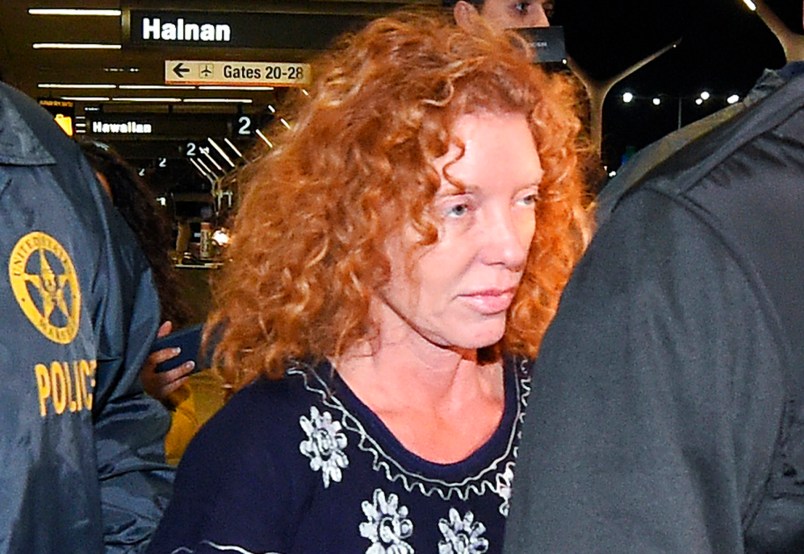LOS ANGELES (AP) — The mother of a fugitive Texas teen known for using an “affluenza” defense in a fatal drunken-driving accident will likely remain jailed for several days in Los Angeles after being deported from Mexico, investigators said Thursday.
Tonya Couch and her 18-year-old, Ethan, were taken into custody this week in Mexico, where authorities believe the pair fled in November as Texas prosecutors investigated whether he had violated his probation.
Ethan Couch was being held at a detention facility in Mexico City after winning a court reprieve that could lead to a weeks- or even months-long legal process in Mexico, a Mexican immigration official told The Associated Press on Thursday. The official spoke on condition of anonymity because he or she was not authorized to be quoted by name.
But his mother was deported and flown to Los Angles, where she was escorted through the city’s sprawling LAX airport in handcuffs by U.S. marshals early Thursday. She will remain jailed in Los Angeles until officers can take her to Texas.
That likely won’t happen until at least next week. Los Angeles District Attorney’s Office spokeswoman Jane Robison said Thursday that no extradition hearing was planned ahead of the New Year’s holiday.
In Texas, prosecutors charged Tonya Couch with hindering apprehension of a felon. Her bond there was set at $1 million, Tarrant County District Attorney’s Office spokeswoman Samantha Jordan said Thursday.
A call to Tonya Couch’s attorney was not immediately returned. It’s unclear why Couch was flown to Los Angeles; U.S. Marshals Service spokesman Eugene Hwang said he couldn’t reveal details about the trip.
Ethan Couch was driving drunk and speeding near Fort Worth in June 2013 when he crashed into a disabled SUV, killing four people and injuring several others, including passengers in his pickup truck. He was sentenced to probation.
During the sentencing phase of his trial, a defense expert argued that his wealthy parents coddled him into a sense of irresponsibility — a condition the expert termed “affluenza.” The condition is not recognized as a medical diagnosis by the American Psychiatric Association, and its invocation during the legal proceedings drew ridicule.
Texas prosecutors believe the mother and son fled the state in late November, after a video surfaced that appears to show Ethan Couch at a party where people were drinking. He then missed a mandatory Dec. 10 appointment with his probation officer.
The mother and son were taken into custody Monday in Mexico, after authorities said a phone call for a pizza delivery led to their capture in the resort city of Puerto Vallarta. Local police said the pair stayed at a condominium complex for a few days before moving to an apartment.
The appeal filed in Mexico on behalf of Ethan Couch argues that deportation would violate his rights. Richard Hunter, chief deputy for the U.S. Marshals Service in South Texas, said Wednesday that the legal maneuver basically takes the deportation decision out of an immigration agent’s hands and asks a higher authority to make it.
Such cases can often take up to several months, depending on the priorities of the local courts, he said.
“It also depends on the fact the Couches have legal counsel,” said Richard Hunter, chief deputy for the U.S. Marshals Service in South Texas. “And it seems to me, if they wanted to, they could pay them as much money as they want to drag this thing out,” Hunter said. “We’re hopeful that’s not the case.”
___
Associated Press reporters who contributed to this report include Mark J. Terrill and Andrew Dalton in Los Angeles; E. Eduardo Castillo and Mark Stevenson in Mexico City; Elizabeth Rivera in Guadalajara, Mexico; Michael Graczyk in Houston; and Emily Schmall in Fort Worth, Texas.
Copyright 2015 The Associated Press. All rights reserved. This material may not be published, broadcast, rewritten or redistributed.









